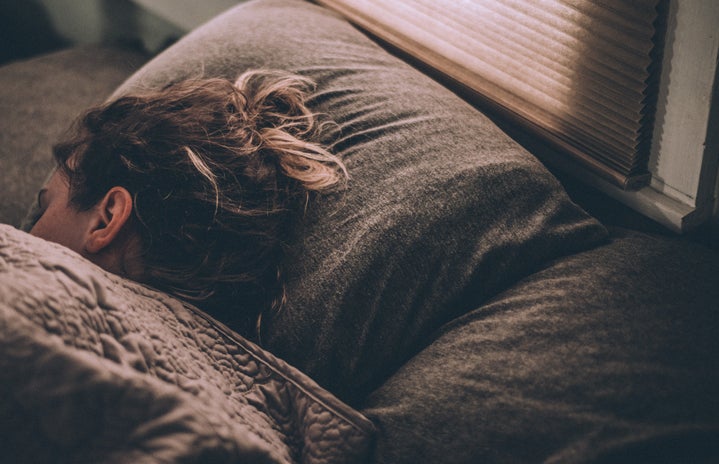Written by Maya Mackey (’24)
With finals week quickly approaching in our shortened semester, we’re all feeling stressed and worn out. Stress, as it so happens, can manifest as much physically as it can mentally—and for me personally, I have difficulty falling asleep. I always find my brain is hyperactive at night, and sometimes I have trouble waking up for class. Because sleep is so important for the brain and necessary for us to do well on all of our finals, here are five tips and tricks that may help establish and maintain a good sleep routine this finals week.
1. Avoid Blue Light
As much as I hate to admit it, I am on my phone before I fall asleep and right after I wake up. After doing some research a few years ago, I learned that the blue light emitted by our devices can affect how long it takes for us to fall asleep by disrupting our natural circadian rhythm, or the bodily process that regulates how and when we sleep. By staying off of your phone for an hour before you plan to go to bed, you’re more likely to fall asleep faster as well as form a healthier sleep schedule.
2. Pick Up A Good Book
If you like to read, this one’s for you! Reading at night is an easy way to entertain yourself before you hit the hay—and it keeps you off your phone. Simply put, a book works similarly to a television show in the way that it’s a form of entertainment. By reading a book and distracting yourself with the story, you can continue to intake information before bedtime while still avoiding that pesky blue light.
3. Listen to Rain Sounds
If you’re like me and can’t sleep when it’s very quiet, I recommend listening to rain or ocean sounds while trying to fall asleep. There are lots of apps you can download that will play sounds that imitate thunderstorms, ocean waves, and forest downpours. Most of these apps will let you set a timer, too, so that your phone will only play the sounds for a set amount of time instead of all night. White noise in any form can help with breathing regulation, and will help you feel calm, relaxed, and overall more prepared to fall asleep.
4. Melatonin
For those of you that may not know, Melatonin is a hormone within our bodies that is released when our body needs sleep (or will be soon.) When taken as a supplement, melatonin may help treat insomnia, short term. Taking melatonin about an hour or two before you go to bed will ensure you get to bed early if you have an exam the next morning—just be sure to avoid taking it late at night, as this might alter your sleep schedule and increase your tendency to oversleep.
5. Practice Breathing Techniques
Believe it or not, practicing breathing techniques can help you sleep—rather, it can help you develop a respiration regulation that will help put your body to sleep faster. Slowing your breathing can lessen the time it takes for your body to transition from being awake into being asleep, as your heart rate and breathing become much slower during this period. In addition, focusing on your breathing creates a distraction for your mind—any worries you might have won’t be at the forefront of your mind.
Hopefully these tips are useful in the coming weeks. Remember, it’s important to establish a healthy sleep regimen—if you make sure to get enough sleep, your brain will thank you the next day, and you’ll have an easier time processing information and retrieving it from your memory later on. Sleep is a form of self-care, so make it a priority!


